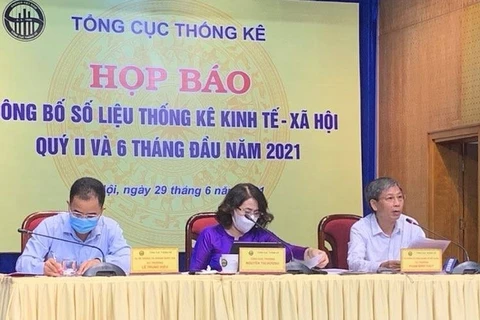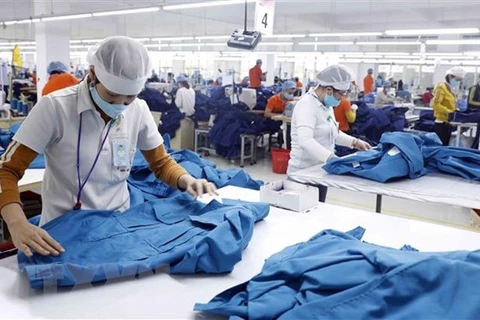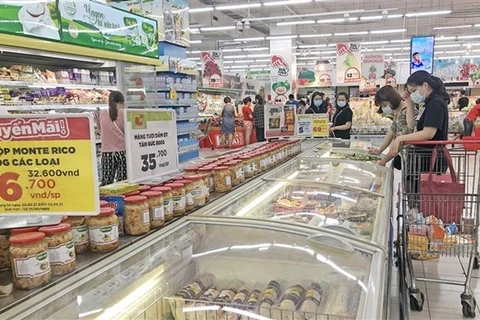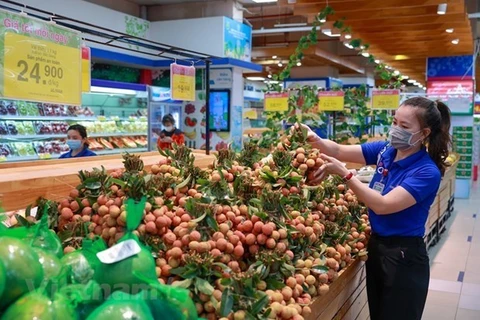Hanoi (VNA) – The Consumer Price Index (CPI) in July picked up 0.62 percent from the previous month and and 2.64 percent against the same month last year, the General Statistics Office (GSO) announced on July 29.
The GSO largely attributed the increase to rising food prices caused by buying in localities hit by the fourth COVID-19 resurgence, the global fuel price hikes, and higher demand for electricity during summer.
The index gained 1.64 percent in the first seven months of this year, the lowest since 2016.
Transport sector posts highest rise
Compared to June, seven out of the 11 main groups of goods and services saw increases, with transport taking the lead (2.36 percent) due to the adjustments of oil and gas prices on June 26, and July 12-27.
It was followed by housing and construction materials (0.88 percent), and restaurants and catering services (0.67 percent), and food (0.36 percent) due to stockpiling of necessities, vegetables, milk and dairy products, processed and frozen food amidst COVID-19.
Among those experiencing a month-on-month decline, prices of cultural, entertainment and tourism services were hit the hardest by COVID-19, dropping 0.1 percent. It was followed by postal and telecom services (0.05 percent), and garment-textile, headwear and footwear (0.03 percent).
The lowest since 2016
Nguyen Thu Oanh, Director of the Price Statistics Department under GSO, said the seven-month CPI growth of 1.64 percent is the lowest since 2016.
Besides, the price of educational services went up 4.46 percent year-on-year, and rice price was up 6.83 percent as effects of higher price of exported rice, plus increasing demands.
Oanh said the Government has instructed ministries and agencies to carry out synchronous solutions to prevent COVID-19 spread and keep market prices stable.
GSO Former General Director Nguyen Bich Lam said it is likely that the CPI will grow further in the remaining months of the year, particularly the final months.
Therefore, the core inflation inched down 0.06 percent in July but edged up 0.89 percent from January to July. These are the lowest levels since 2011.
However, it is expected to hover around 3.3 – 3.6 percent, lower that the target set by the National Assembly, he added.
Meanwhile, the index rose 1.47 percent year-on-year in the first half of 2021, also the lowest since 2016, the GSO said.
The index in June edged up 0.19 percent month-on-month, 1.62 percent against last December and 2.41 percent year-on-year, GSO General Director Nguyen Thi Huong said.
The rises are largely due to increases in prices of materials, fuels, electricity and fresh water, Huong explained.
Despite impacts from two waves of COVID-19 outbreaks in the first half of this year, especially on industrial hubs, Vietnam still posted gross domestic product (GDP) growth of 5.64 percent and its export revenue rose 28.4 percent over the same period last year.
Although the GDP expansion was lower than the target set by the Government, it was much higher than 1.82 percent recorded in the same period last year.
This showed the effective policies, strategies and directions from the central to local levels with the implementation of “dual targets” of controlling the pandemic and ensuring socio-economic development at the same time.
In addition to efforts to implement the directions of the Prime Minister, the Ministry of Labour, Invalids and Social Affairs has finalised a draft resolution on policies to support employers and employees meeting difficulties due to the COVID-19 pandemic, with the total aid worth more than 27.3 trillion VND (nearly 1.2 billion USD).
At the same time, the Ministry of Finance on June 24 also issued a circular on the continued cutting of 29 types of fees as applied in 2020 and the first half of 2021, as well as additional one type of fee in agriculture.
In terms of capital, Deputy Governor of the State Bank of Vietnam Dao Minh Tu said that the bank will direct the credit system to focus on production and closely control the credit for risky areas. The bank will continue to apply measures to remove difficulties in bank credit access, thus creating favourable conditions for enterprises and people in borrowing loans from banks, he added./.

























